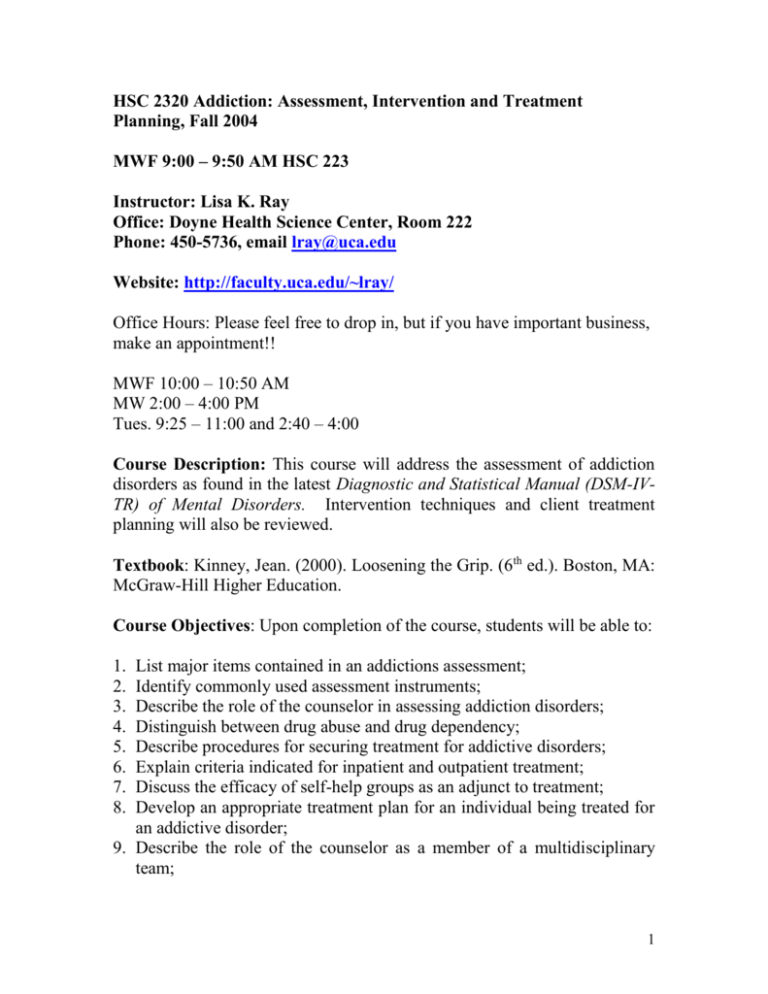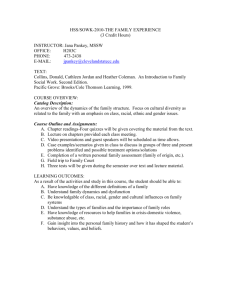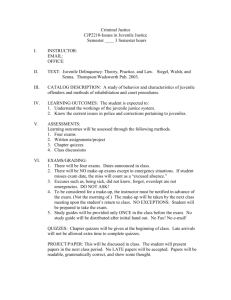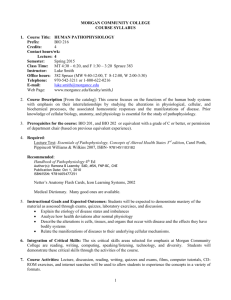HSC 2320 Addiction: Assessment, Intervention
advertisement

HSC 2320 Addiction: Assessment, Intervention and Treatment Planning, Fall 2004 MWF 9:00 – 9:50 AM HSC 223 Instructor: Lisa K. Ray Office: Doyne Health Science Center, Room 222 Phone: 450-5736, email lray@uca.edu Website: http://faculty.uca.edu/~lray/ Office Hours: Please feel free to drop in, but if you have important business, make an appointment!! MWF 10:00 – 10:50 AM MW 2:00 – 4:00 PM Tues. 9:25 – 11:00 and 2:40 – 4:00 Course Description: This course will address the assessment of addiction disorders as found in the latest Diagnostic and Statistical Manual (DSM-IVTR) of Mental Disorders. Intervention techniques and client treatment planning will also be reviewed. Textbook: Kinney, Jean. (2000). Loosening the Grip. (6th ed.). Boston, MA: McGraw-Hill Higher Education. Course Objectives: Upon completion of the course, students will be able to: 1. 2. 3. 4. 5. 6. 7. 8. List major items contained in an addictions assessment; Identify commonly used assessment instruments; Describe the role of the counselor in assessing addiction disorders; Distinguish between drug abuse and drug dependency; Describe procedures for securing treatment for addictive disorders; Explain criteria indicated for inpatient and outpatient treatment; Discuss the efficacy of self-help groups as an adjunct to treatment; Develop an appropriate treatment plan for an individual being treated for an addictive disorder; 9. Describe the role of the counselor as a member of a multidisciplinary team; 1 10.Utilize the DSM-IV-TR Of Mental Disorders in addressing clients with a dual diagnosis; 11.Demonstrate problem solving skills when participating in a mock intervention; 12.Demonstrate organizational and writing skills in formulating a substance abuse history. Course Outline: I. Criteria used to establish substance abuse and substance dependency A. Review of Diagnostic and Statistical Manual (DSM- IV-TR) of Mental Disorders B. Review of commonly used assessment instruments II. Intervention A. Choosing most appropriate treatment B. Getting clients into treatment C. Working with families III. Treatment A. Detoxification issues B. Working through denial C. Abstinence as a goal in recovery D. Relapse prevention E. Use of self-help groups IV. Treatment Planning A. Relationship of treatment plan to client’s treatment B. The multidisciplinary treatment team C. Writing the treatment plan D. Reviewing the treatment plan E. Discharge planning F. Follow-up and evaluation Course Requirements and Evaluation: 1. Exams: There will be four exams including the final exam. Each exam will be worth 100 points. Students will be given the examination schedule at the beginning of the semester. 2. Quizzes: Unannounced quizzes will be given throughout the semester. If a student is late or absent for a quiz, that quiz cannot be made up. The quizzes will be “extra credit”. 2 3. Research Paper: Students will be required to complete a research paper a course requirement. The paper must be typed, free of excessive grammatical errors, and prepared on a topic relevant to the course. Students will be given further instructions regarding the paper and the paper date at the beginning of the semester. 4. Grading Scale: 90-100% A 80-89% B 70-79% C 60-69% D Below 60% F Tentative exam schedule: Exam # 1: Sept. 20, 2004 Exam # 2: October 18, 2004 Exam # 3: November 15, 2004 Final Exam week: December 6-10, 2004 Exams 400 Research paper 100 Absences from class: Students are required to attend class regularly and to be punctual in their attendance. Students are responsible for all work missed due to illness or university business. Students may be dropped from class after the fourth absence. If there is a legitimate reason for missing more than two classes, the student should discuss the matter with the instructor. If there is a major illness or other significant event that would necessitate the student being absent for a prolonged period of time, the student should notify the instructor so that the student will not be dropped from class. Students should be courteous and discreet in the event of an emergency necessitating the need for the student to leave the classroom. Examinations and quizzes: All examinations are to be taken at the time they are scheduled. If a problem arises requiring a student to be absent for an exam, the student should meet with the instructor as quickly as possible to reschedule the exam. If possible, the student should meet with the instructor before the scheduled examination. Unannounced quizzes CANNOT be made up. If the student is late or absent for a quiz, that quiz cannot be made up. Cell phones and pagers: Cell phones and pagers must be turned off before class begins. Abuses of these electronic devices will result in the student being asked to drop the class. 3 Research paper: Research paper will be due on the scheduled due date. If the student knows the paper will be late, the student should discuss the situation with the instructor prior to the due date. Student Handbook: Students should be familiar with all policies in the student handbook; especially the sexual harassment policy and academic policies. Documented disabilities: Any student with a documented disability (e.g., physical, learning, psychiatric, vision, hearing, etc.) who needs to arrange reasonable accommodations must contact the instructor and the Disability Services at the beginning of the semester. The University of Central Arkansas adheres to the requirements of the Americans with Disabilities Act. If accommodations are needed under this Act due to a disability, contact the Office of Disability Support Services at 501-450-3135. Academic dishonesty and plagiarism: Students involved in or supporting acts of academic dishonesty and/or plagiarism will lose credit for the assignments or exam and may be withdrawn from the class with a WF. Book bags and notebooks will be kept under the desks and may not be opened during the exam. Students leaving the class during the exam will not be allowed to continue the exam. Please take care of your needs before you come to take the exam. Students may also be asked to draw for seat assignments. Students are responsible for bringing two # 2 lead pencils and a pen to the exam. Refer to the Student Handbook for more information. 4






